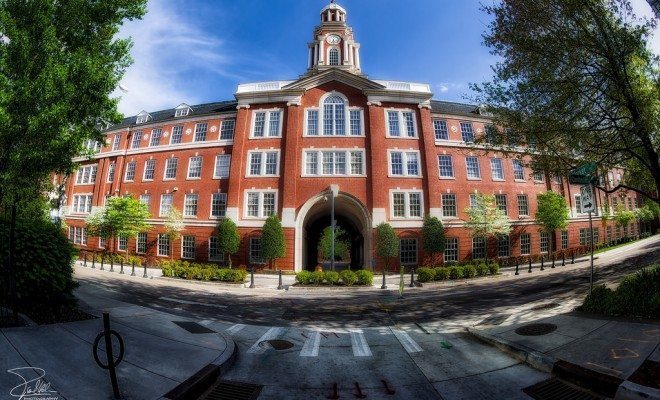
Schools
Want to Make Sure You Get a Job After Law School? Apply for a Clerkship Now
Looking to attend a law school that can hook you up with a judicial clerkship? Well here’s some information that might help you decide — Robert Morse of US News and World Report just ranked law schools by 2012 J.D. graduates who hold the most judicial clerkships.
What are Judicial Clerkships?
Clerkships are like beefed-up, paid internships that are specifically designed for law students. They are interactive opportunities that allow aspiring attorneys to assist judges in federal, state, or local courts. Clerks work jointly with judges on their caseloads and get a peek inside the courtroom environment.
Clerkships provide students with practical experience, require them to conduct legal research, and practice legal writing. Law school graduates, as well as second- and third-year students usually apply for the prestigious positions. Clerks work from one year to three years and receive salaries based on “legal work experience subsequent to graduation from law school, bar membership, and applicable locality pay adjustments,” according to the Administrative Office of the U.S. Courts.
Why are Clerkships Valuable?
Law students are encouraged to pursue judicial clerkships because of the experience, wealth of knowledge, and networking opportunities they provide to participants. According to the University of Memphis Clerkship Manual, students should seek judicial clerkships because:
A judicial clerkship is one of the most prestigious, interesting, and professionally rewarding jobs in the legal profession. Judicial clerkships provide credentials, skills, and connections that will benefit you for your entire legal career. A judicial clerk obtains behind‐the‐scenes experience with the workings of the judicial system, has the opportunity to develop and refine research, writing, and legal analysis skills, and learns the intricacies of trial or appellate procedure. Because such positions are limited and viewed as highly prestigious, a judicial clerkship can further career goals and provide a competitive edge in seeking both private and public sector legal employment.
Morse Code: Judicial Clerkship Rankings
Morse broke down the rankings for graduates employed in federal courts separately from those working at state and local courts. He calculated his proportions by examining the percentage of employed graduates with respect to the type of courts they work in.
While the rankings indicate which schools may give grads a better chance of landing clerkships in federal, state, or local courts, it’s important to note that a high percentage does not guarantee a position. Likewise, those schools with lower rankings do not necessarily indicate failure to obtain positions.
- Yale University (36.3%)
- Stanford University (29.1%)
- Harvard University (18.5%)
- University of Chicago (15%)
- Duke University (14.3%)
The top five schools with the highest percentages of 2012 J.D. graduates working in state and local judicial clerkships were ranked as follows:
- Rutgers, The State University of New Jersey – Camden (42%)
- Rutgers, The State University of New Jersey – Newark (33.2%)
- Seton Hall University (33.1%)
- University of Hawaii – Manoa (Richardson) (28%)
- University of South Dakota (20.6%)
Typically, federal clerkships are harder to obtain, but state and local clerkships provide valuable experience as well. Morse cited U.S. Supreme Court clerkships as the ultimate achievement for law school graduates, though they are the hardest to land. Perhaps that’s why the proportion of J.D. graduates with federal clerkships graduated from schools which consistently rank higher nationally. There’s also a cyclical aspect — alumni of Ivy League universities who ascend to clerkships can help their young peers connect with those positions down the road. Furthermore, it seems schools that rank lower overall send more students to state and local courts, possibly because those positions are less competitive. Regardless, law schools encourage their students to apply for clerkships at any level in order to advance their careers and dip their toes into the legal profession.
Though the legal field may be suffering setbacks right now, the number of students securing long-term employment after graduating law school is slowly increasing. According to the American Bar Association, the number of J.D. graduates who were employed increased 0.7 percent since 2012, but the number of grads who are unemployed or seeking work also increased 0.6 percent. Thus, law students should take advantage of opportunities like clerkships to advance their chances of finding stable work after graduation.
Indiana University’s Robert H. McKinney School of Law considers legal clerkships “attractive to future legal employers who hire former judicial clerks for their significant legal knowledge, insider view of the court system, and ability to view cases from the court’s perspective.” The behind-the-scenes experience earned through judicial clerkships serves as a bridge between graduating law school and practicing law. It also provides recent graduates with the opportunity to figure out where they might want to spend their legal careers — inside or outside a courtroom. So, if you’re considering law school, you may want to check out your prospective educator’s clerkship rankings. It could make all the difference for your future.
—
Natasha Paulmeno (@natashapaulmeno)
Featured image courtesy of [Frank Kehren via Flickr]








Comments